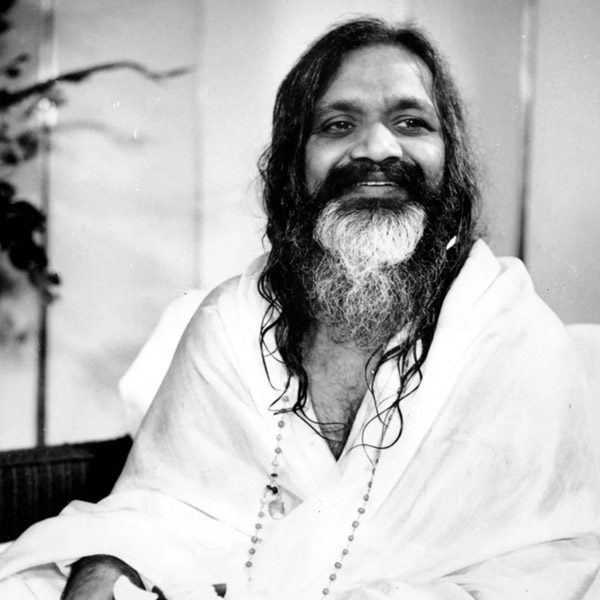
Sunday, August 27, 1967
The Beatles leave Bangor and react to Brian Epstein’s death
Last updated on June 6, 2024

Sunday, August 27, 1967
Last updated on June 6, 2024
Location: Hugh Owen Buildings, Bangor University, UK
Article Aug 26, 1967 • The Beatles join a seminar with Maharishi Mahesh Yogi
Article Aug 27, 1967 • Brian Epstein dies at 32
Article Aug 27, 1967 • The Beatles leave Bangor and react to Brian Epstein's death
Interview Aug 27, 1967 • John Lennon, George Harrison and Ringo Starr react to Brian Epstein's death
Interview Aug 28, 1967 • Paul McCartney interview for Liverpool Echo
Next article Aug 30, 1967 • Clive Epstein becomes chairman of NEMS Enterprises
Aug 24, 1967 • The Beatles meet Maharishi Mahesh Yogi
Aug 25, 1967 • The Beatles travel to Bangor with Maharishi Mahesh Yogi
Aug 26, 1967 • The Beatles join a seminar with Maharishi Mahesh Yogi
Aug 27, 1967 • The Beatles leave Bangor and react to Brian Epstein's death
Aug 31, 1967 • The Beatles meet Maharishi Mahesh Yogi in Kensington
October 14-15, 1967 • Paul McCartney and George Harrison visit the Maharishi in Sweden
On August 24, 1967, Paul McCartney, John Lennon, and George Harrison attended a lecture by Maharishi Mahesh Yogi at London’s Hilton Hotel. The Maharishi invited them to a five-day retreat in Bangor, Wales, starting the next day. On August 25, accompanied by their partners and other celebrities, the four Beatles travelled to Bangor by train. On August 26, The Beatles attended an initiation course in Transcendental Meditation by Maharishi Mahesh Yogi, after which they held a press conference announcing they had given up taking drugs.
On the morning of August 27, 1967, The Beatles attended a ceremony led by Maharishi Mahesh Yogi. Soon after the ceremony, Paul McCartney received a phone call from Peter Brown, Brian Epstein’s assistant, who informed him about the tragic news of their manager’s untimely death at the age of 32. Shocked by the sudden loss, Paul McCartney immediately shared the devastating news with his fellow bandmates and their partners. In order to return to London, Paul took a chauffeur-driven car (driven by photographer Henry Grossman?) and was accompanied by his girlfriend Jane Asher on the journey back. Meanwhile, John Lennon and George Harrison granted brief interviews with reporters. Ringo Starr was also present, but he chose to speak sparingly. Eventually, John, George and Ringo returned to London as well.
The Beatles meet again with the Maharishi on August 31 in London.
The actual ceremony in Bangor when we got given the mantra was nice. You had to wait outside his room as he did people one by one, and then you got to go into the inner sanctum, just a room they’d put a lot of flowers in and a few drapes around, and lit a few joss sticks. You had to take some cut flowers to Maharishi as some sort of offering. It was all flowers with Maharishi, but flowers were the symbol of the period anyway so it was very easy. So you got your flowers, you took your shoes off and went into a darkened room where Maharishi was. It was quite exciting. It reminded me of Gypsy Rose Lee’s tent in Blackpool — ‘Come inside!’ — Santa’s grotto or something. Maharishi explained what he was going to do, he said, ‘I’ll just do a few little bits and pieces…’ however he put it, of this and that, little incantations for himself, then he said, ‘I will just lean towards you and [ll just whisper, very quietly, your mantra.’ He gives you your mantra and he’s only going to say it once and you repeat it once, just to check you’ve got it, and he says, ‘Yes, that’s it.’ And he said, “The idea is that you don’t mention that to anyone ever again, because if you speak it, it will besmirch it to some degree; if you never speak it, then it’s always something very special.’
Paul McCartney – From “Paul McCartney: Many Years from Now” by Barry Miles, 1997
We were shocked with the news of Brian’s death, which was terrible. We checked with Maharishi: ‘What do you do, man? Look, this great guy’s dead …’ He said, “Well, we’ll just have to send him great vibrations. There’s nothing more you can do, just have to meditate and feel good ourselves. There’s no more you can do.’ So that slightly placated us. It helped a little bit, in my own mind. I can’t speak for anyone else. Then eventually we went off, sorrowed by the news of Brian’s death. It was shattering, sad, and a little frightening. We loved him.
Paul McCartney – From “Paul McCartney: Many Years from Now” by Barry Miles, 1997
In Bangor we heard that Brian had died. That was a real downer because of the confusion and the disbelief: ‘You’re kidding me!’ Your belief system gets suspended because you so badly don’t want to hear it. You don’t know what to do with it. If you look at our faces in the film shot at the time, it was all a bit like: ‘What is it? What does it mean? Our friend has gone.’ It was more ‘our friend’ than anything else. Brian was a friend of ours, and we were all left behind. After we arrived there with hope and flowers – now this. And then we all left – real slow.
Ringo Starr – From “The Beatles Anthology” book, 2000
By Sunday morning in Bangor, everyone had been initiated into transcendental meditation and believed we had found a new way of living. Then the telephone rang and the world turned upside-down. Brian Epstein was dead. It was the most shocking, dreadful moment. Paul took Peter Brown’s call. Brian had been found dead in his bed at his house in Chapel Street. He was thirty-two years old. At that point, there was no explanation. We were stunned when Paul, ashen-faced, repeated what he had been told. It had to be a mistake. Paul and George were in complete shock. I don’t think it could have been worse if they had heard that their own fathers had dropped dead. The unthinkable had happened. […]
We were outside, just after breakfast, when we heard the news. We had been on our way to Maharishi, who was going to talk to us privately—and suddenly that seemed the right thing to do so we kept the appointment. We needed someone wise and spiritual to tell us what to think. We were lost. I even thought, idiotically, Maharishi is so amazing, maybe he can bring Brian back to life. He couldn’t, of course, but he was calm. He talked about reincarnation, but he said, too, that negative feelings would impede Brian’s journey. His spirit was with us, and to release it, we must be joyful for him, laugh and be happy. It was hard to feel any joy that day, but it was an enormous help to have someone to turn to, who knew with such certainty how we should cope. I can’t help thinking it was no coincidence that we were with Maharishi when Brian died. Someone up there was looking after us.
Pattie Boyd – From “Wonderful Tonight: George Harrison, Eric Clapton, and Me“, 2008
When Brian’s death cut short our time in Bangor, Maharishi had invited us to stay with him at his ashram in India. Every year he held a course for Westerners who wanted to become TM instructors. None of us did, but we wanted to study it some more, and I think the Beatles thought their fans might copy them, which meant they would be using their influence on young people in a good way.
Pattie Boyd – From “Wonderful Tonight: George Harrison, Eric Clapton, and Me“, 2008
I gave Paul McCartney and Jane Asher a ride back to London from Bangor when The Beatles had been with the Maharishi and heard Brian Epstein had died. I was there as a friend, I wasn’t taking photos.
Henry Grossman – From The Independent, March 22, 2013
The strangest thing was that, at the moment they were being given a philosophy in which they could live their own lives, it was at that moment that Brian died. The one that wanted them to be a group.
Marianne Faithfull – From “The Beatles: Off the Record” by Keith Badman, 2008
The Maharishi acted so badly and so inappropriately, in my opinion. He gave them the classic Indian thing, which is, ‘There was a death in the family. There are many families, there is one family. Brian Epstein has moved on. He doesn’t need you any more, and you don’t need him. He was like a father to you, but now he is gone, and now I am your father. I’ll look after you all now.’ I was appalled!
Marianne Faithfull – From “The Beatles: Off the Record” by Keith Badman, 2008
We were so shocked when [Brian Epstein] died on August 27, 1967. Jim, Ruth and I had spent the day at Bangor University in North Wales, where the Beatles and “the other George Harrison”, a journalist with the Liverpool Echo (I know, I know. Two George Harrisons. What are the odds, right?), were attending a seminar with the Maharishi Mahesh Yogi.
We all had lunch in a canteen-like area at long wooden tables, where simple fare was served: salads, water, bread, and fruit.
As we got in our car to drive back to Heswall, Paul came out and stuck his head in the window to bid us farewell. While we were talking, George Harrison (the journalist) shouted from the steps, “Paul, Brian’s on the phone, he wants to speak to you about tomorrow.” So Paul left to take that call. It must have been about 2.30pm so we know Brian was alive and well then. […]
As we got in the front door at Rembrandt, the phone was ringing. It was Louise Harrison, George’s Mum. She said that Brian had committed suicide, or that it might have even been murder. She had heard something on Radio Caroline, the pirate radio station, and at that stage the news was very garbled. We were in complete shock. We’d just heard Paul called to the phone to talk to Brian! It was many hours before we could reach any substantial conclusion to the situation.
It had to have been an accidental overdose. He had just spoken to Paul to say he would join them the next day.
What a void his death left in so many lives.
Angie McCartney – Step-mother of Paul McCartney – From “Angie McCartney: My Long and Winding Road“, 2013
[…] The next day we went to see them again on Sunday. We were allowed to wait outside the door this time. We had only been waiting for 10 minutes when John came running out before anyone could ask for an autograph. Paul was the next to come out, his stepsister Ruth was holding his left hand, and in his right hand, he had a load of newspapers. I was a bit nervous of asking him for an autograph as he had his hands full. But I went up to him and asked, “Paul, please may I have your autograph?” He smiled and said “Sure, love.” As he signed my book on top of all his newspapers, I told him that my present looked like a large fluffy flower and not like a duster as some people had thought. He laughed and said that he had thought that my present looked like a flower. As soon as he had given my autograph book and pen back, he was surrounded by pressmen.
I couldn’t get to Ringo as he was also surrounded by pressmen. George was only talking to one man, therefore I ran up to him to ask for his autograph. But it was evident George was arguing with the man. I stood by George’s elbow for five minutes listening to the argument. When they had finished talking, George was in such a temper that he didn’t see me and walked away and opened a door and slammed it behind him! I’m glad I didn’t follow as I might now have a broken nose! I went home feeling very happy.
But that happiness did not last for long, as that night we heard of the tragic death of Brian Epstein. I decided to go up to the college and try to see The Beatles and say how sorry I was. But on the road to the college, I saw a big, black car passing and sitting in the back was Paul. He looked pale and his face expressionless.
Contact with the Beatles – As told by an anonymous girl in Wales – Around the Beatles fan club newsletter – October 1967 – From Meet the Beatles for Real: Contact with The Beatles
From Wikipedia:
Epstein’s death
The Beatles’ intention was to attend the entire ten-day seminar, but their stay was cut short by the death of their manager in London on 27 August. Epstein had arranged to entertain friends at his property in Sussex over the bank holiday weekend, but had said that he might join the band towards the end of the seminar. The Maharishi consoled them by saying that Epstein’s spirit was still with them, and their good thoughts would help him “to have an easy passage” and journey to his “next evolution”. The Beatles held a press conference, during which Lennon and Harrison explained the Maharishi’s views on death. According to McCartney, the Maharishi “was great to us when Brian died”. Cynthia Lennon later wrote: “it was as though, with Brian gone, the four needed someone new to give them direction and the Maharishi was in the right place at the right time.”
Aftermath and cultural influence
The Beatles made plans to spend time at the Maharishi’s training centre in India in late October. However, at McCartney’s urging, they postponed the trip until the new year to work on their Magical Mystery Tour film project, since he was concerned that they should first focus on their career, with the loss of Epstein. Harrison and Lennon appeared on David Frost’s television programme in autumn 1967 espousing the benefits of Transcendental Meditation, at which point, according to his wife, Lennon was “evangelical in his enthusiasm for Maharishi”. Due to the interest generated by their first appearance on the show, on 29 September, Frost invited the pair back a week later, when they discussed TM with a studio audience comprising clergymen, academics and journalists.
The Beatles’ allegiance to the Maharishi and his teachings marked the first time that the band had committed to employing their influence to popularising a cause. Their attendance at the Bangor seminar, together with Harrison and Lennon’s promotional activities, resulted in Transcendental Meditation becoming a worldwide phenomenon. In his book American Veda, author Philip Goldberg likens the Maharishi’s Hilton lecture to Swami Vivekananda’s visit to the West in 1893, in terms of its importance for Indian religion. As a result of the coverage given to the Beatles’ interest, words such as “mantra” and “guru” became commonly used in the West for the first time. While the band’s new, anti-LSD message was met with approval, their championing of the Maharishi and his TM technique was often the subject of confusion and ridicule in the mainstream press, particularly in Britain. At a court event in October, Queen Elizabeth II remarked to Sir Joseph Lockwood, the chairman of EMI: “The Beatles are turning awfully funny, aren’t they?” Now publicised as “The Beatles’ Guru”, the Maharishi went on his eighth world tour, giving lectures in Britain, Scandinavia, West Germany, Italy, Canada and California.
Among the counterculture and the underground press, the Maharishi’s ascendancy was viewed as a significant development in the youth movement’s search for universal spiritual awareness. To some members of the US counterculture, the Beatles had found the “answer”; their endorsement of meditation was especially welcome in Haight-Ashbury, where summer’s end was marked by an increase in drug casualties. The Beatles’ more spiritually aware peers were also inspired by their example. Scottish singer Donovan sought out the Maharishi in California, having bonded with Harrison following the latter’s return from India in late 1966. Donovan later said that he and Harrison had avidly read Hindu spiritual texts and discussed meditation as a way to achieve genuine higher consciousness, but they had lacked the method and a “guide” until meeting the Maharishi. Harrison also introduced Dennis Wilson of the Beach Boys to the Maharishi when he and Lennon joined their teacher at a UNICEF benefit in Paris in December. Other artists who followed the Beatles’ lead into TM included members of the bands the Grateful Dead and Jefferson Airplane, all of whom met the Maharishi with Jagger and Donovan in Los Angeles that autumn.
Due to the Beatles’ attendance at Bangor and their commitment to study in India, the Maharishi’s following increased tenfold to 150,000 students. In November 1967, The Village Voice said that, given how many rock musicians had embraced meditation, and the popularity of TM initiation courses on university campuses, “it looks now that Maharishi may become more popular than the Beatles.” In February 1968, having twice delayed their departure for India, the Beatles and their wives or girlfriends joined the Maharishi at his ashram in Rishikesh. Their fellow students included Donovan, Mike Love of the Beach Boys, and American actress Mia Farrow. […]
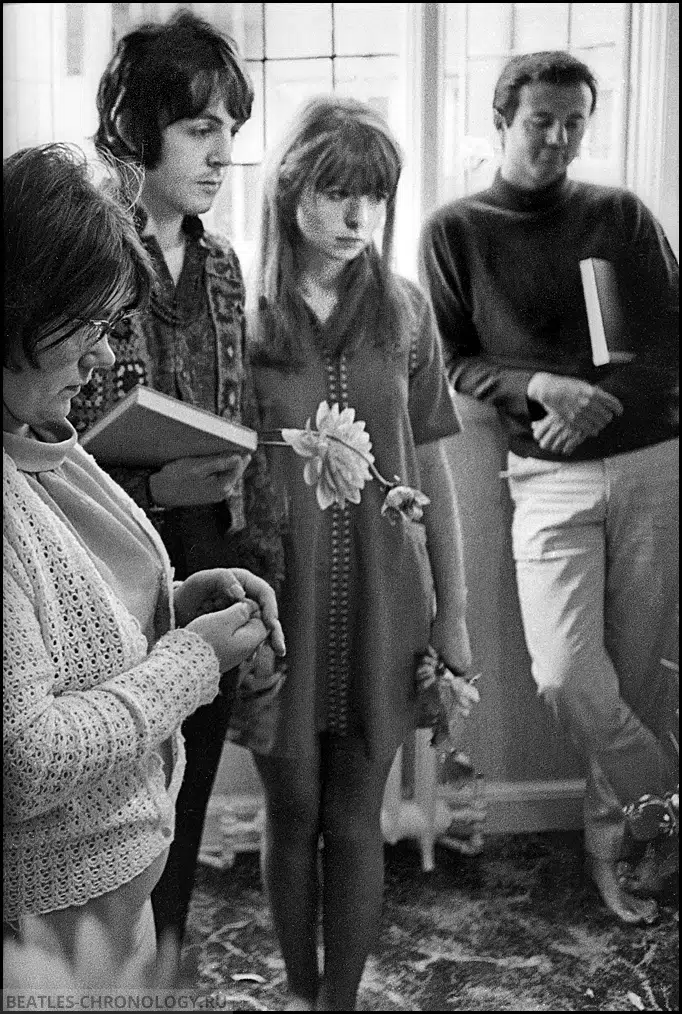
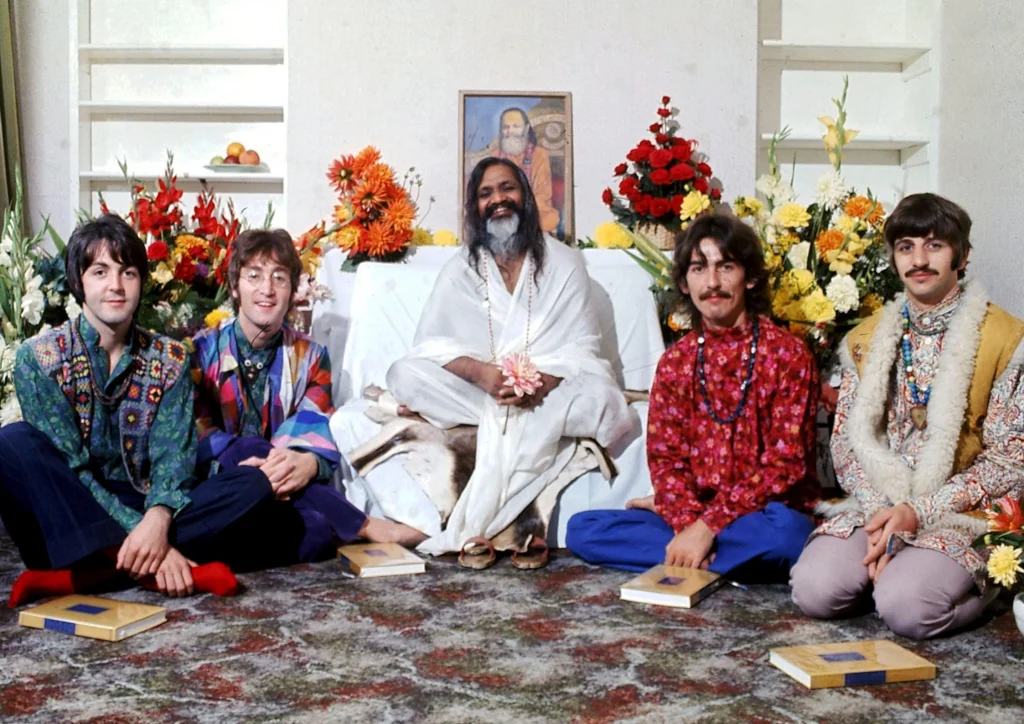
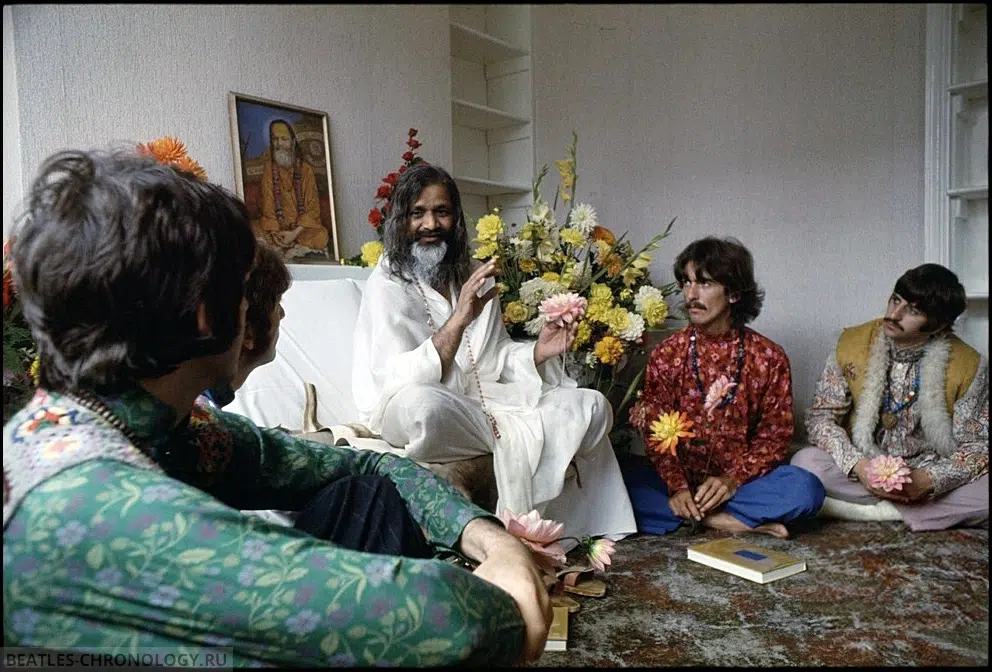
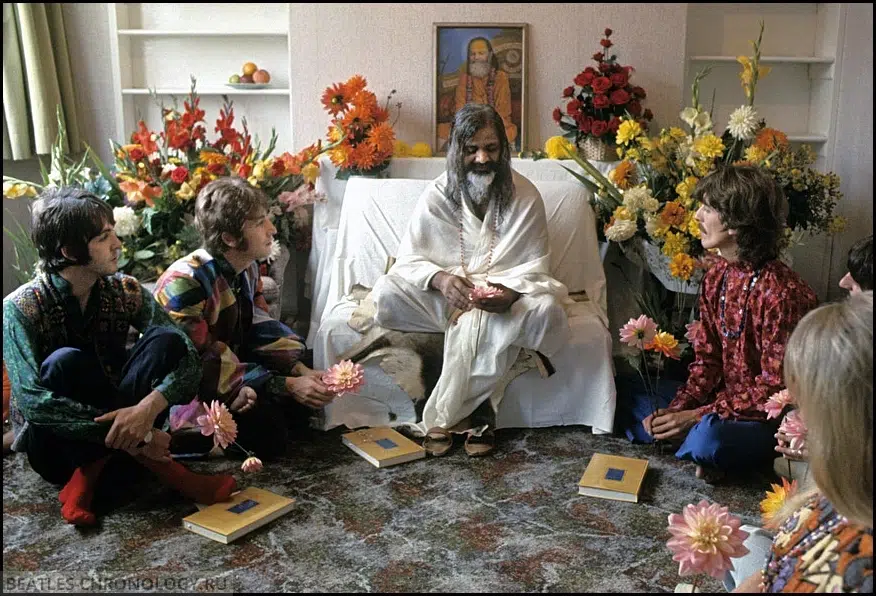
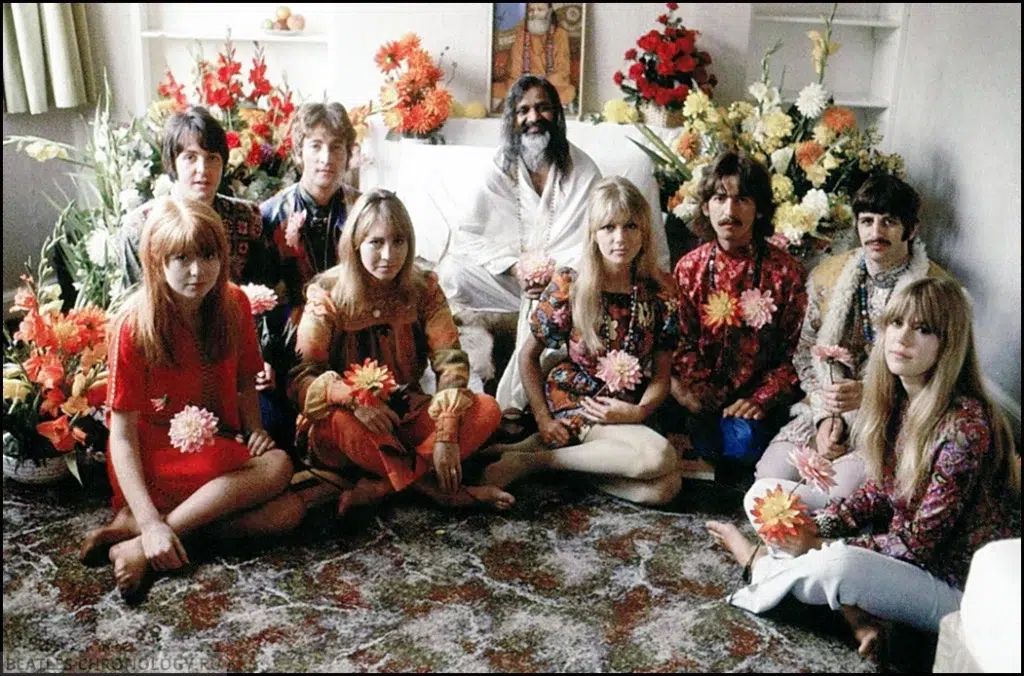
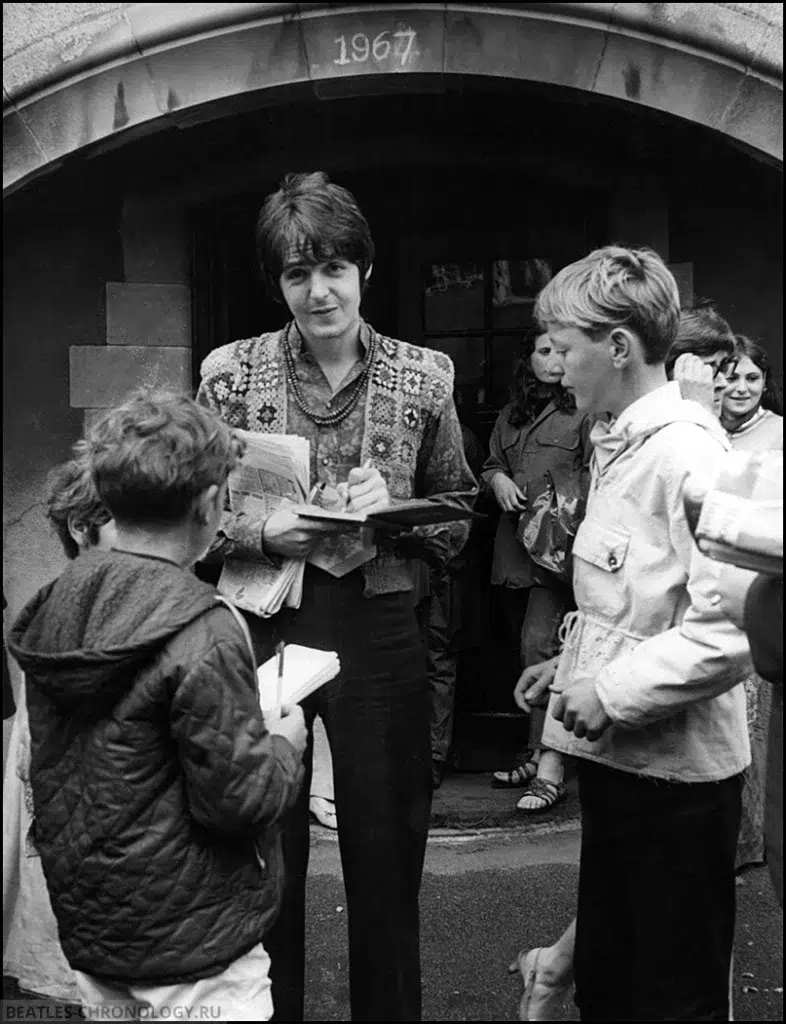
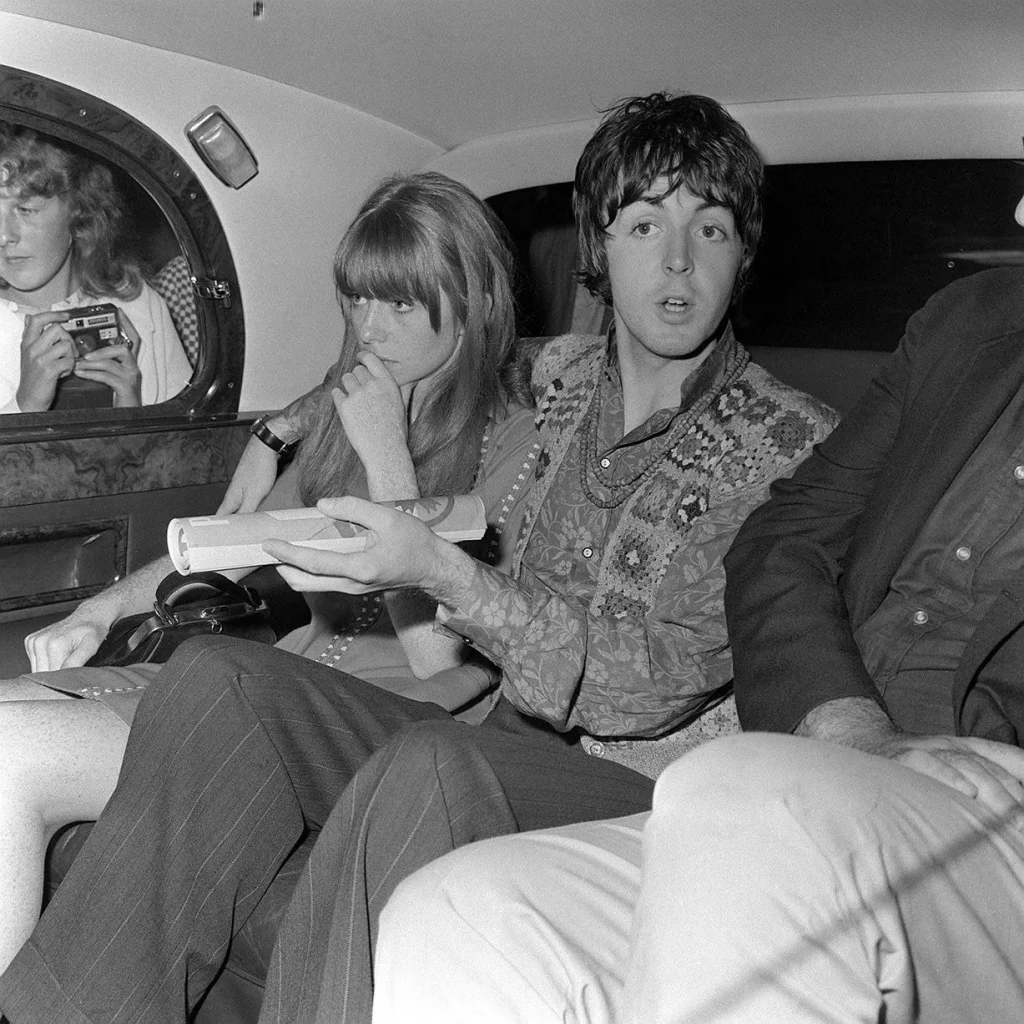
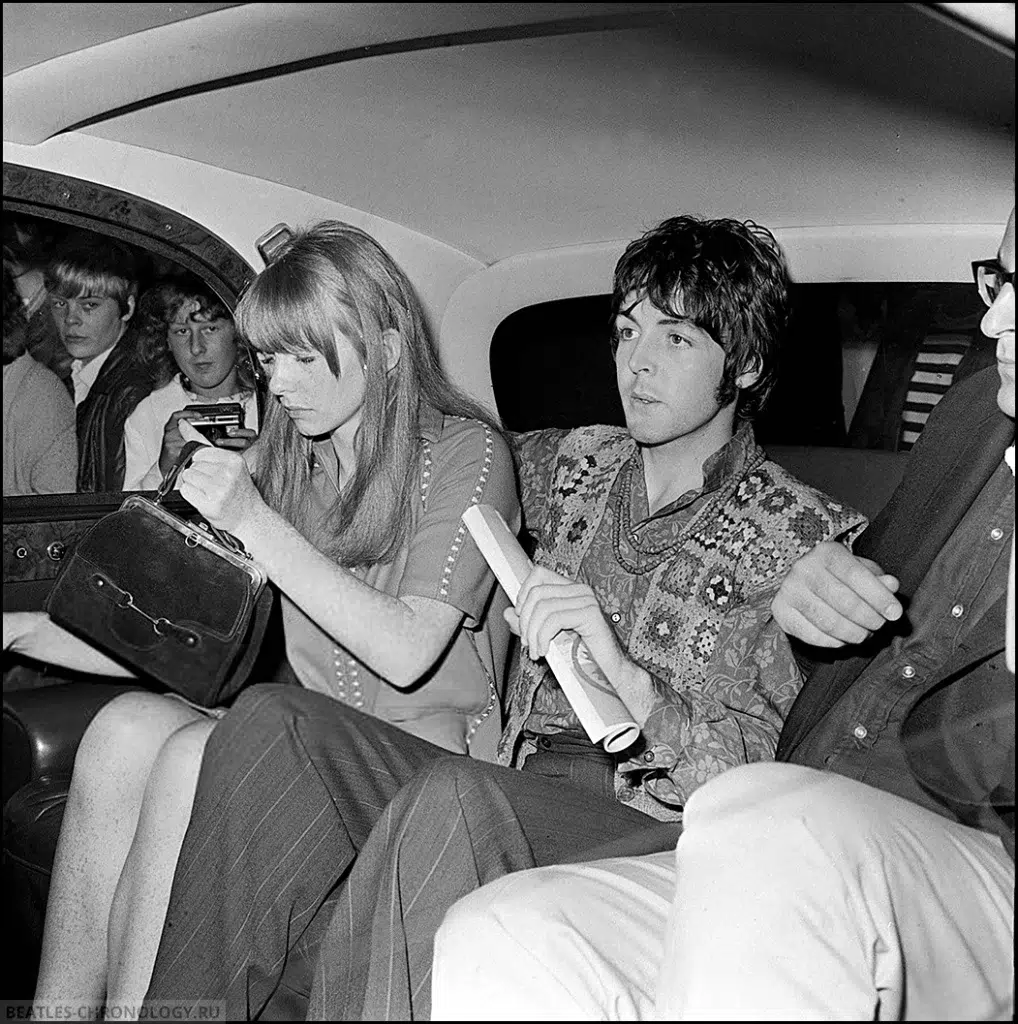
A telephone rang… and meditation turned to mourning at Bangor
Paul McCartney and I were standing in the quadrangle of Normal College at Bangor. All the other newspapermen who had besieged the Beatles’ headquarters of meditation had been given a few brief answers to questions and had left. But Paul and I are old friends. He wanted to tell me quietly and simply as he could what was happening to him and to John, George and Ringo at the feet of the man they were calling “Master,” the 57-years-old Himalayan mystic, Maharishi Mahesh Yogi.
It was not much easier for Paul to express than for me to understand, but we both tried. And then, from the alcove inside the front doors of the college hostel where they had their rooms, came the burr-burr or a phone bell.
Everyone else had disappeared. Only Paul and my cameraman colleague, Steve Shakeshaft, were there to hear its buzzing.
It broke into Paul’s thoughts. He said: “I’d better answer that George. Excuse me.“
A few moments later he returned and said: “There was nobody on the line. That’s odd,” and went on talking.
The phone bell started up again. Paul answered it. This time I could hear his voice but not what he said.
The next minute I saw him racing upstairs to the quarters where he and his Beatles colleagues were staying. He did not come down again until pale-faced, he and his girl friend, Jane Asher, emerged with their luggage, got into a friend’s car and left for London.
This friend, an American, whom I had met when he accompanied us on one of the Beatles’ tours of the United States, confided to me before they left: “The call that interrupted your talk with Paul was from London to give him the news of Brian Epstein’s death. That is why he went straight up to tell the others and why he didn’t come down again as he had promised you, to bring Jane Asher with him for a photograph of them together.“
The news was too incredible for belief at first. It brought a sudden sense of utter disaster over the quiet cloisters of Normal College —and blasted away all thoughts of meditation.
In place of the deep contemplation with which the day had started there was deep mourning as the realisation of Brian’s death hit the Beatles and their girls, John’s wife Cynthia, George’s wife Patti, and the elfin-like red-head Jane Asher. The girls wept and tears streaked their mascara. But they did not care about appearance now.
A few hours went by. Paul and Jane had sped off towards London. The others were waiting for cars from London to arrive and take them back, too. The three who remained agreed to talk to us.
Almost fiercely, George put forward his belief: “Brian isn’t dead. There’s no such thing as death except in a physical sense. Life goes on. He will return because he desired bliss.“
One thing stood out like a beacon. The previous 48 hours of being with Maharishi and learning from him the secret of deep meditation was standing them in good stead at this time of tragedy.
John Lennon told me: “If it had happened while we were all in London we wouldn’t have known where to turn. But Maharishi has given us comfort and we feel a sense of calm and peace in spite of all the disturbance going on around us.“
What is this teaching of “transcendental meditation” that has gripped such unlikely converts as the sophisticated, wealthy Beatles?
Come back with me to that conversation I was having with Paul McCartney in the Hall quadrangle.
“We aren’t thick, you know, George,” he said. “We can think for ourselves and we certainly wouldn’t latch on to this unless we were convinced it was good. How can I explain it? Well, suppose a doctor offered you a pill and said: ‘Take this and it will wipe out all your anxieties and tensions; enable you to concentrate, make you work harder and better: give you a great feeling of well-being and, above all, will have no ill effects of any kind — only good ones.’
“If a doctor said that to you, what would you do? Throw the pill away or take it? Because in a way, that’s what the meditation of Maharishi are all about. They enable us to relax as I, personally, have never relaxed before. The others feel the same as me, although we’ve only just started to learn what it is all about.”
I asked Paul: “What is the feeling you get when you are practicing meditation as you are doing?“
He thought a few moments and said: “It’s rather like sitting in a big armchair in front of a blazing open fire. As you watch the flames leaping, your conscious thoughts seem to mingle with the flames and disappear into nothing. Your tensions go, your become more and more relaxed and at peace. For a while. the worries of everyday life and world around you fade away. When something stirs you and you come back to the normal state of consciousness, you have a feeling of well-being that you didn’t have before. You can get up and go about your normal life, but you somehow feel better, fitter. more able to cope with anything that comes along.
“And that is how Maharishi’s teaching of transcendental meditation affects us. With it, all feelings of needing drugs to relax or to stimulate disappear. They aren’t necessary. Meditation takes their place in a clean healthy way.
“I suppose we have all taken some kind of at one time or another when we felt depressed or needed to carry on working late and required an artificial up-lift. But never again. This form of meditation does away any need for drugs.
“Yet the great thing is that all it demandes of you is half an hour every day, just to put your feet up, if you want to, in your own home before you start off for work.
“Here at Bangor, we’ve been having breakfast, then going in for a session of meditation with Maharishi, for, of course, we are still novices and need to be taught the correct technique so that we can go home and follow it.
“Maharishi tells us that this method can be practised anywhere by any normal person. All other Indian mystics have always thought and taught that meditation can be practised only in solitude, isolation and under hard self-discipline. This one doesn’t require that. And it doesn’t interfere with your ordinary way of life, either. If you want to drink or smoke, just go ahead although not obviously, while you are actually in meditation.
“This isn’t like wrapping your mind in cotton wool and shutting yourself off from the world for months. You live energetically but peacefully with the world and people around you in your everyday life.”
“It isn’t a matter of possessions. It makes no odds how much money a man’s worth, it is still a certainty that he suffers from most of anxieties that affect everybody else. His bank balance doesn’t come into it.”
I said to Paul: “A lot of folk are going to ask why four boys who have made fortunes so quickly and are young enough to enjoy every minute of your lives and your wealth should have any stresses and strains that cail for this kind of meditative treatment.”
With a serious face he replied: “We are no different from anybody else. We have our problems just as you do. We find tensions and frustrations slowly building up inside us until we have to blow our tops. And that makes things worse.”
“Even things like having to give Press conferences have caused us a load of worry. You know, wondering what questions we shall be asked and if we would come through all right.
“Yet even after only a few hours of listening to Maharishi and learning the rudiments of deep meditation, we’ve reached the state of being so relaxed and at peace that when we were asked if we would have a Press conference today, I found myself saying: ‘A Press conference? Oh, good.’ Sounds daft, doesn’t it? After such a short time. But it shows how situations that used to make us sweat can now be met with a feeling of confidence and relaxation. The tension has gone.”
Then came the telephone bell ringing nearby. Paul broke off to answer it. He and his fellow Beatles have never been so much in need of that inner peace and tranquility of mind as they are right now.
From Liverpool Echo – August 28, 1967
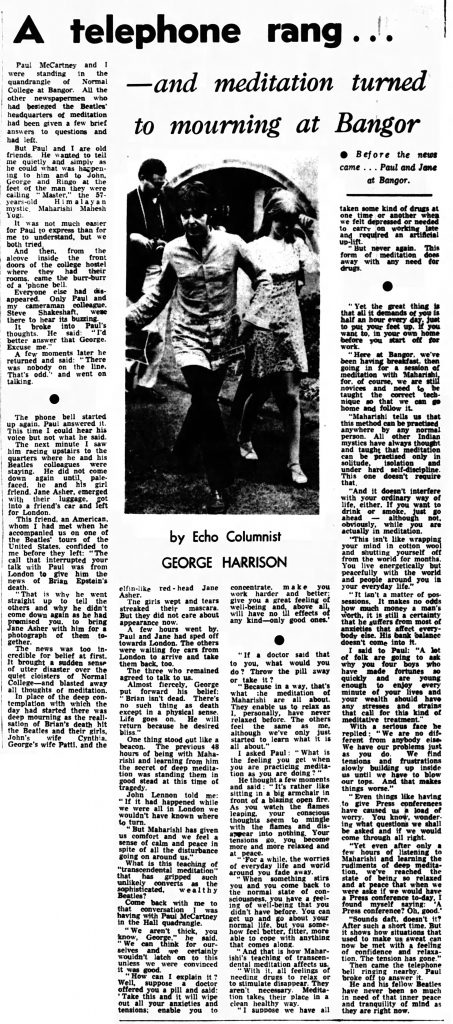
BRIAN EPSTEIN DEATH SHOCK
Brian Epstein, thirty-two-year-old manager of the Beatles and the man who launched the Liverpool group on the road to fame, was found dead yesterday afternoon by his house-keeper at his home in Chapel Street, Belgravia, London.
She became worried when she found his door locked and got no reply. She called others and the door was opened to find Liverpool-born Mr Epstein dead in his bed. Police were then called but foul play is not suspected.
A friend of Mr Epstein said: “He has been unwell for some months. The reason for his death is at present unknown, but there were no untoward circumstances associated with it.” One of two senior police officers who visited the house, said: “So far as we are concerned it is sudden death, and we cannot say any more than that.”
For the Beatles, who on Friday travelled to Bangor with the Himalayan mystic, Maharishi Mahesh Yogi, a day of mediation suddenly became a day of mourning. Within an hour of hearing the news, Paul McCartney left for London with girlfriend Jane Asher in a chauffeur-driven car and the other Beatles were expected to follow.
Epstein, born in Rodney Street, on September 19, 1934, went to Liverpool College and Wrekin College. With ambitions of becoming an actor, he went to the Royal Academy of Dramatic Art, but returned to Liverpool and began to sell records in his family’s stores, a chain of furniture and television shops in the north-west.
So many people asked for Beatles’ records that he traced the group to the Cavern Club and agreed on a management contract.
He once said that he managed them at a loss in the first year. One major recording company turned them down, saying they did not like the sound, but later, when the Beatles were earning as much as £8,000 a week, Epstein received 25 per cent of their earnings.
He emerged as the key figure in British pop music, with Liverpool’s CiIIa Black, Gerry and the Pacemakers, Billy J. Kramer and other leading names in the pop world, in his stable.
Three years ago he moved his headquarters from Liverpool to London and bought the £31,500 house in Belgravia.
He had package tours of artistes going out all over Britain, and master-minded the multi-million-pound Beatles merchandising campaign.
His business interests also included the theatre. He helped back several successful London shows, and two years ago acquired controling interest in the Saville Theatre, Shaftesbury Avenue.
Last night the 8.30 pop concert the Saville Theatre, headed by the Jimmy Hendrix Experience, was cancelled as a tribute to Mr Epstein. The six o’clock performance had already begun before the news reached the theatre.
Epstein’s father, Mr Harry Epstein, died just over a month ago. He was a warden of the Greenbank Drive synagogue, Liverpool, until last year.
In spite of his business success, Brian Epstein once said: “I’m not a commercial person, really. I’m still a frustrated actor.”
His own tastes in music inclined towards Bach and Sibelius.
Mr Tony Barrow, senior Press officer for NEMS Enterprises, said that on hearing of Mr Epstein’s death, the Billy J. Kramer group had decided to return to London from Middlesbrough. “I understand they have cancelled an engagement there,” said Mr Barrow. He added that Cilla Black was in Portugal.
He was one of us says Lennon
“You can’t pay a tribute in words to Brian. There is no such thing as death, only death in the physical sense. Life goes on,” said Beatle George Harrison in Bangor last night.
Ringo Starr said: “I have only had a few deaths of close friends and relatives, but I have been stronger this time. He was always generous to us. He dedicated so much of his life to The Beatles.”
John Lennon said: “We loved him, we liked him. He was just one of us.”
They said Epstein was due to arrive at Bangor today, also to be initiated as a member of the International Meditation Society. Immediately they heard of the death they went to see the Maharishi, who told them to have pleasant thoughts of Epstein because those thoughts would reach him wherever he might be.
The three Beatles were calm at the Press conference held as they were awaiting their cars to take them back to London.
Said Paul McCartney, with one arm around Miss Asher’s shoulders: “It is a great shock and I am very upset. We are going back to London.”
From Liverpool Daily Post – August 28, 1967
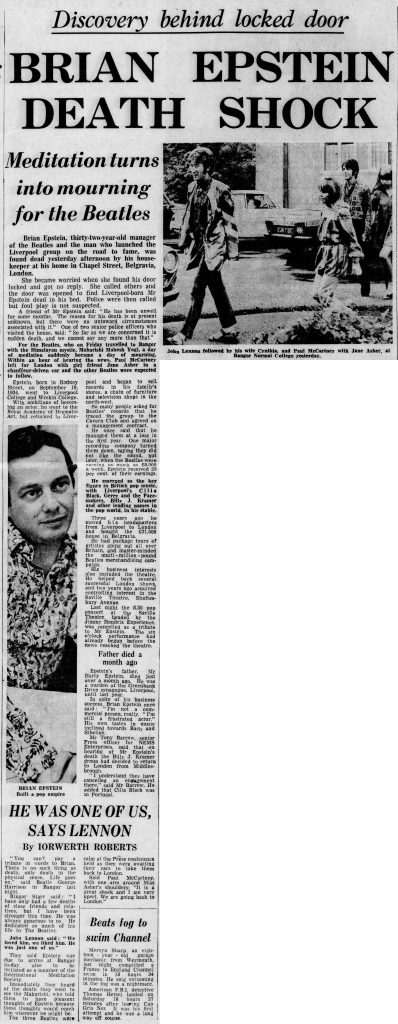
Beatles visit Wales to hear philosopher
THE Beatles left London last Friday to spend five days in Bangor, North Wales, listening to the meditation lectures of Indian philosopher Maharishi Mahesh Yogi.
But they returned on Sunday following the news of Brian Epstein’s death, John Lennon, George Harrison and Paul McCarney attended a lecture by Maharishi at the Hilton hotel, London, on Thursday night.
From Melody Maker – September 2, 1967
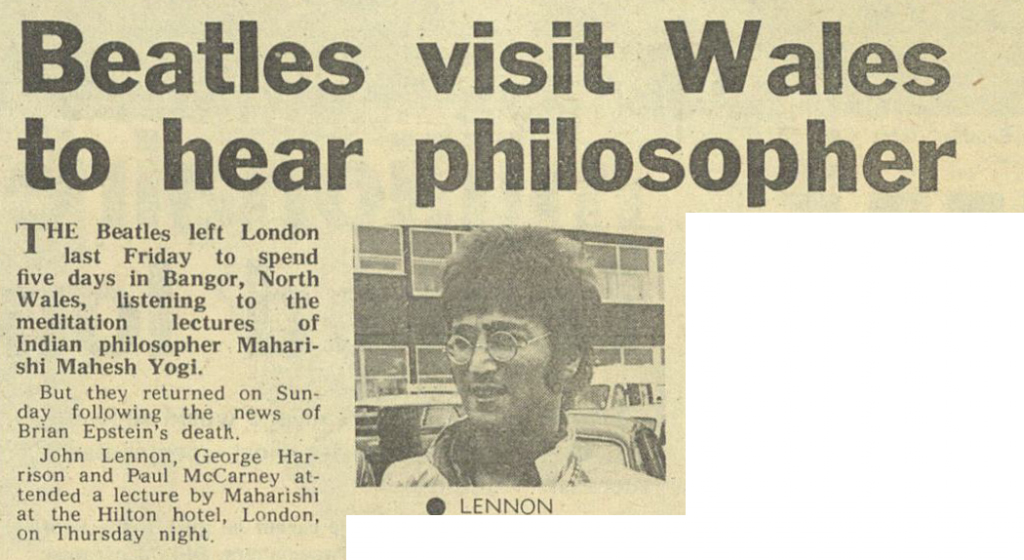
BEATLES PLAN TO MEDITATE IN INDIA
THE BEATLES leave for two months in Swargshram, India at the end of October. They will spend two months at the Academy of Transcendental Meditation on the Ganges, studying under the instruction of Maharishi Mahesh Yogi.
A spokesman for Nems said on Monday: “This is all the news that will be announced about the trip because they are going as private individuals. There will be no press facilities either during their trip to and from India or while they are in India.”
The Beatles will return to Britain in time for Christmas.
Last weekend, they completed filming for their self-directed Magical Mystery Tour and will spend the next three weeks editing the film and writing and recording the incidental music.
“Reports that the film will be shown on BBC-2 are speculative,” said Nems. “The Beatles will finish the film before it is decided who will show it.”
From Melody Maker – September 1967
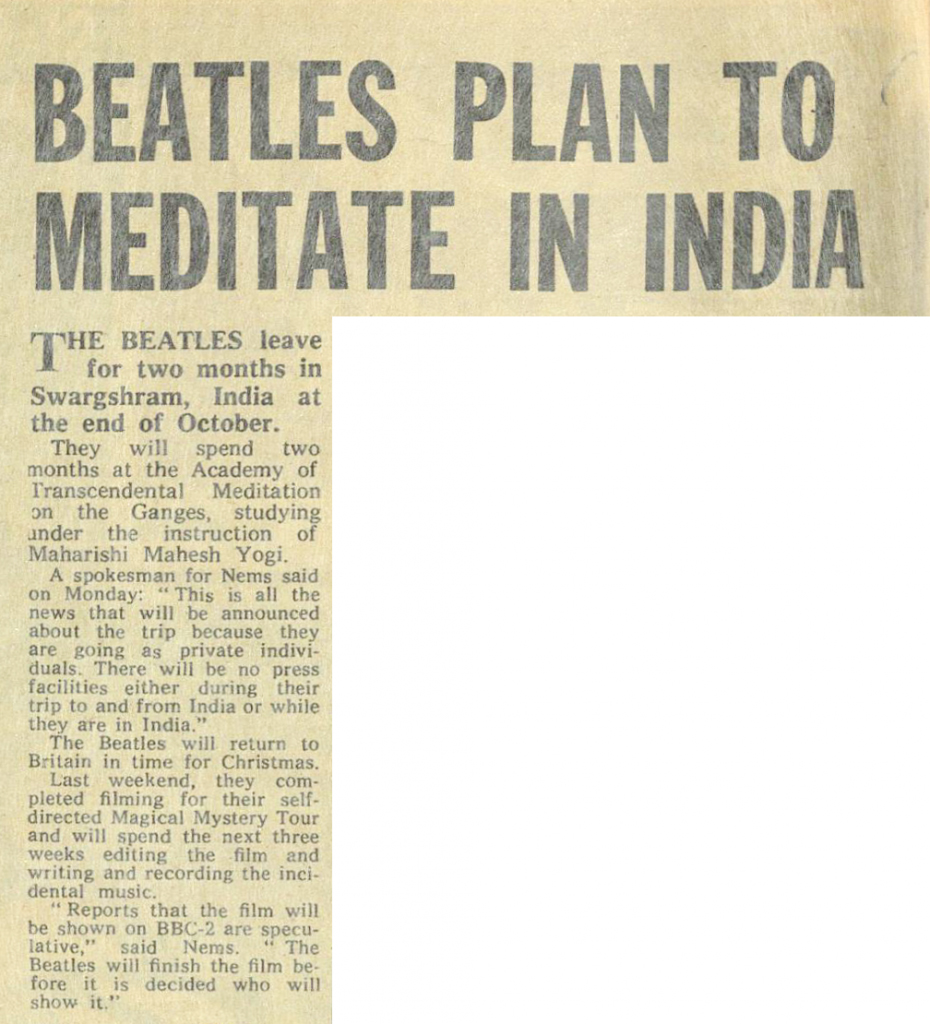
The Beatles Diary Volume 1: The Beatles Years
"With greatly expanded text, this is the most revealing and frank personal 30-year chronicle of the group ever written. Insider Barry Miles covers the Beatles story from childhood to the break-up of the group."
We owe a lot to Barry Miles for the creation of those pages, but you really have to buy this book to get all the details - a day to day chronology of what happened to the four Beatles during the Beatles years!
If we modestly consider the Paul McCartney Project to be the premier online resource for all things Paul McCartney, it is undeniable that The Beatles Bible stands as the definitive online site dedicated to the Beatles. While there is some overlap in content between the two sites, they differ significantly in their approach.

Notice any inaccuracies on this page? Have additional insights or ideas for new content? Or just want to share your thoughts? We value your feedback! Please use the form below to get in touch with us.